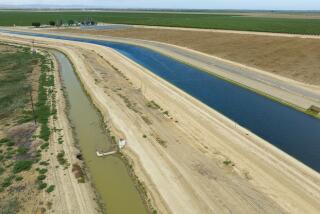Clouded readings of EPA study of Dimock water, featured in ‘Gasland’
Environmental Protection Agency reports recently obtained by several Pennsylvania families who feared their well water was polluted by natural gas drilling appear to contradict the agency’s original statement late last week that the water was safe to drink, according to the investigative website ProPublica and the environmental group Water Defense.
A week ago, the EPA said that tests of the well water of 11 families in Dimock, Pa., out of a total of 60 the agency said it would analyze “did not show levels of contamination that could present a health concern.”
Starting in 2009, some residents of Dimock, a small town in northeastern Pennsylvania, have complained that their well water turned cloudy and foul-smelling after an oil and gas company drilled for gas using hydraulic fracturing, a controversial extraction technique that involves shooting underground water and sand laced with chemicals to unlock reservoirs of fossil fuels.
The families recently received more detailed summaries of the tests from the EPA that seem to belie the agency’s initial assertion that the water was not significantly contaminated. Six families shared their EPA reports with Josh Fox, the Pennsylvania-based director of the Oscar-nominated documentary, “Gasland,” who, in turn, relayed the data to Water Defense and ProPublica. The organizations asked four outside scientists to review the test results.
The outside analysis found high levels of methane or chemicals in the water of all the families, Water Defense said. The water of four of the six families had methane levels in excess of Pennsylvania’s threshold for mitigation efforts. One of the reports “showed methane levels seven times” the state limit and nearly twice “the EPA’s less stringent standard,” according to ProPublica.
Methane in itself isn’t considered toxic. But concentrations of it in enclosed spaces raise the risk of explosions.
“The data is consistent with EPA’s assertion that no substances were found at levels exceeding drinking water standards,” said George Stark, a spokesman for Cabot Oil & Gas, which drilled the Dimock wells. “As to the other substances ProPublica cites, there are currently no drinking water standards for these substances. It is important to note that there is still nothing in this data or elsewhere that indicates that these substances are related in any way to Cabot’s operations.”
The EPA did not answer requests for comment.
The tests also showed that the methane was accompanied by the gas ethane, which the experts said indicated that the methane may have come from a deep underground reservoir that was drilled and not from surface sources.
“Among the other substances detected at low levels in Dimock’s water are a suite of chemicals known to come from some sort of hydrocarbon substance, such as diesel fuel or roofing tar. They include anthracene, fluoranthene, pyrene and benzo(a)pyrene – all substances described by a branch of the Centers for Disease Control and Prevention as cancer-causing even in very small amounts,” the ProPublica review of the EPA reports found.
Another host of chemicals detected by the water testing has not been evaluated by the federal government for the risks they might pose to human health.
In its statement last week, EPA said it did find that six of the 11 homes had “sodium, methane, chromium or bacteria” in their well water but that concentrations were all “within the safe range for drinking water.” The sampling results also found low levels of arsenic in the water of two homes, which will be retested.
The EPA cautioned that the sampling was meant to determine the presence of contamination, not the viability of fracking. “EPA has not done any detailed review to determine the cause” of the water problems in Dimock, the agency said in response to questions last week.
RELATED:
Study: ‘Fracking’ may increase air pollution health risks
Poll: More Americans now back domestic drilling
Federal court rejects delay of N.M. power plant pollution controls







